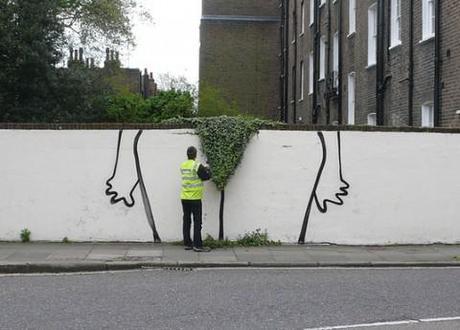 A Banksy bikini wax art piece which recently appeared in London. Photo credit: dull hunk http://flic.kr/p/crVcxd
A Banksy bikini wax art piece which recently appeared in London. Photo credit: dull hunk http://flic.kr/p/crVcxd
The background
Family physician Emily Gibson has sparked a heated debate about the practice of pubic hair removal. In a widely read piece which first appeared at KevinMD.com, Gibson, the medical director of the health center at Western Washington University, argued that the “clean and bare” look is at best ill advised when it comes to one’s health down there.
Leave your pubic hair well alone (unless you aren’t scared of MRSA)
“I must have missed the declaration of war on pubic hair,” exclaimed Gibson who said that “the amount of time, energy, money and emotion both genders spend on abolishing every hair from their genitals is astronomical.” “It is a sadly misconceived war,” sighed Gibson, who said that “long ago, surgeons figured out that shaving a body part prior to surgery actually increased, rather than decreased, surgical site infections. No matter what expensive and complex weapons are used – razor blades, electric shavers, tweezers, waxing, depilatories, electrolysis – hair, like crab grass, always grows back and eventually wins. In the meantime, the skin suffers the effects of the scorched battlefield.” Pubic hair removal “naturally irritates and inflames the hair follicles left behind, leaving microscopic open wounds,” informed Gibson, who warned that “when that irritation is combined with the warm moist environment of the genitals, it becomes a happy culture medium for some of the nastiest of bacterial pathogens, namely Group A Streptococcus, Staphylococcus aureus and its recently mutated cousin methicillin-resistant Staphylococcus aureus (MRSA).” Pubic hair “does have a purpose, providing a cushion against friction that can cause skin abrasion and injury, protection from bacteria and other unwanted pathogens, and is the visible result of long-awaited adolescent hormones, certainly nothing to be ashamed of or embarrassed about,” concluded Gibson, who urged mankind to “let it be.”
‘Bare down there’ fad may pass
Jeremy Laurence of The Independent contacted UK specialists on the issue and found some support for Gibson’s argument. Dr Bav Shergill, Consultant Dermatologist at Brighton and Sussex University Hospitals Trust, said: “I agree that some of the methods of pubic hair removal can lead to damage to the skin itself as well as increasing the risk of infections.” “‘Bare down there’ is a fashion amongst some groups right now and may pass once people get fed up with the high level of maintenance,” suggested Shergill.
“The elimination (or lessening, as it may be) of pubic hair is a beauty standard of our time, just as powdered wigs were a beauty standard during colonial times, or beards and facial hair were de rigeur for men during the 19th and early 20th centuries,” argued Carrie Murphy at Blisstree.com.
You vagina is your vagina (it’s really up to you what you do with it)
Writing a Blisstree.com, Carrie Murphy wrote that, “while I understand her concerns about the widespread cultural trend of hairless genitalia, I think the doctor might be magnifying the issue. After all, your vagina is your vagina.” Murphy said she “gotten quite a few Brazilian waxes in my time and I stopped not for health concerns, but because they’re so damn expensive. But I think of lot of women my age feel the same way about their hair down there: we’ve grown up in a culture that idealizes smooth, hairless, waxed women (thanks to the rise of the porn industry and debateably, the influences of Carrie Bradshaw, Barbie, and Hugh Hefner).”
Murphy insisted that women are shaving “because it makes them feel better about themselves and their bodies. Is it weird that some women feel better about themselves when they have hairless vaginas? Sure, I guess so. Is some of that a result of cultural pressure? Undoubtedly. Are women smart enough to make their own decisions about whether to have a ‘full bush’ or a ‘full Brazilian?’ Yep.” “It’s your body and you should be comfortable with it. Because honestly, what you do with your hair down there is only your business—no one else’s,” concluded Murphy.

